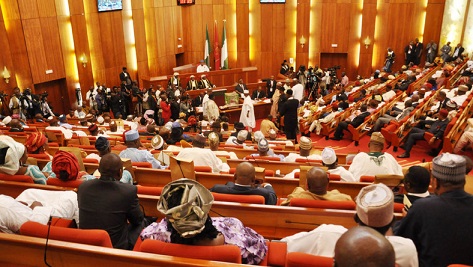
info.afrindex.com
China-Africa Trade Information Service

info.afrindex.com
China-Africa Trade Information Service

Image:pulse.ng
The Nigerian Senate introduced a bill on Wednesday, March 11, 2020, banning the use of generators in the country.
The bill which was sponsored by Senator Bima Muhammadu Emagi (APC Niger South), passed its first reading on the floor of the red chamber.
If eventually signed into law, the bill dubbed 'Generating Set (Prohibition/Ban) Bill', will prohibit the usage of generating sets in the Federal Republic of Nigeria.
The ban will however not include generating sets used for essential services which include -Medical purposes, Airports, Railway stations/services, Elevators, Escalators, Research Institutions, and other facilities that require 24 hours electric power supply.
The continued heavy reliance on fossil fuel-powered generators in Nigeria by government institutions, businesses and households for electricity supply constitutes a major threat to the nation's climate change plans.
Diesel or petrol generators are often used in most countries as backup or emergency power when the national grid fails or during power outages or to provide energy in remote areas. But in Nigeria, generators have become the primary source of electricity for most businesses and households, as supply from the national grid remains abysmally low.
After many years of government's failure to solve the nation's electricity woes, the power sector was privatised in 2013 in a bid to attract private capital and significantly improve electricity supply.
But power generation has in the last four years mostly hovered between 3,000MW and 4,000MW, unchanged from what it was pre-privatisation. It stood at 3,688.6MW as of December 22, 2017, down from 4,265.2MW on December 8, according to data from the Federal Ministry of Power, Works and Housing.
With the power sector still stuck in crisis after privatisation, many businesses, households and public institutions continue to rely heavily on generators, on which they spend a lot to fuel and maintain.
Based on the figures presented in the National Renewable Energy and Energy Efficiency Policy and Rural Electrification Strategy and Implementation Plan, about 40 per cent of the Nigerian population have access to grid-connected electricity, out of which 72 per cent reside in urban areas and 28 per cent in rural areas.
Out of the estimated 16.4 million rural households in the country, only about 4.6 million are connected to the electricity grid.
Small-scale businesses and families spend an average of N3.5tn ($21.8bn) yearly to power their generators with diesel and petrol, a German development agency, GIZ, said in a note on October 2015, entitled: ‘Promoting Clean Energy Investments in Nigeria’.
According to the agency, about 86 per cent of the companies in Nigeria own or share a generator and about 48 per cent of their total electricity demand is covered by these private generators, with estimates suggesting that between 8,000MW and 14,000MW of decentralised diesel generator capacity is currently installed in the country.
The telecommunications sector is one of the largest end-users of diesel generators in the country, with the total number of generators in the sector estimated at 24,252, according to a recent World Bank report.
"With several millions of privately installed diesel generators, Nigeria leads Africa as a generator importer and is one of the highest importers worldwide, with the total annual import figure being N17.9bn ($112m)," GIZ said.
Unreliable power supply had created a buoyant market for diesel-powered generators in Nigeria and other African countries.
"Around 40 per cent of businesses in Tanzania and Ethiopia operate their own generators, rising to over 50 per cent in Kenya. In Nigeria, around four in every five Small and Medium Enterprises install their own generators," it said.
The report said Africa's demand for imported generators had created a fast-growing market for companies in China, France and the United Kingdom.
In 2016, Nigerian importers spent a total of $243.6m on electricity generators and converters.